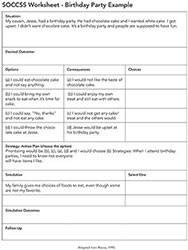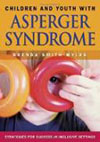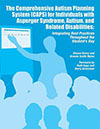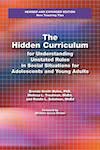Autism Center Grab and Go Resource Gallery of Interventions
SOCCSS
Explore SOCCSS (Situation, Options, Consequences, Choices, Strategies, Simulations). Developed by Jan Roosa, SOCCSS was designed as a teaching strategy to help individuals analyze and comprehend social interactions. The SOCCSS strategy provides a step-by-step process for helping an individual build the skills needed for social competence. This technique helps an individual to reflect on a problem or situation, determine alternative options and strategies, recognize consequences, and choose an appropriate course of action.
Examples

SOCCSS
Book Suggestions

Children and Youth With Asperger Syndrome: Strategies for Success in Inclusive Settings
Myles, B.S.
Children and Youth With Asperger Syndrome provides important strategies in teaching children and youth diagnosed with AS. This essential resource for teachers and other educators presents research-based instructional, behavioral, and environmental strategies for teachers, including the following:
- Adaptations for success in general education settings
- Environmental modifications, including visual supports and organizational strategies
- Technology accommodations
- Transition planning
- Emotional, behavioral, and social supports
Children and youth with AS are often misunderstood. These individuals have great potential that frequently remains unrealized because the modifications they require to be successful are not made. By using the practical strategies in this guide, however, educators can at last effectively meet the needs of students with AS.

The Comprehensive Autism Planning System (CAPS): For Individuals with Asperger Syndrome, Autism, & Related Disabilities
Henry, S., & Myles. B. S.
This comprehensive, yet easy-to-use system allows educators to understand how and when to implement an instructional program for students with autism spectrum disorders (ASD). The CAPS model answers the questions (a) What supports does my student/child need in each class to be successful? (b) What goals is my student/child working on? and (c) Is there a thoughtful sequence to the student's/child's day that matches his learning style. This timely resource addresses adequate yearly progress (AYP), response to intervention (RTI), and positive behavior support (PBS) in a common-sense format. The CAPS process was designed to be used by the child's educational team, consisting of parents, general educators, special educators, paraprofessionals, speech-language pathologists, occupational therapists, physical therapists, administrators, psychologists, consultants, siblings, and others who are stakeholders in the student's education. The structure of this innovative tool ensures consistent use of supports to ensure student success as well as data collection to measure that success. In addition, CAPS fosters targeted professional development. Because CAPS identifies supports for each of the student's daily activities, it is possible for all educational professionals working with the student to readily identify the methods, supports, and structures in which they themselves need training.

The Hidden Curriculum for Understanding Unstated Rules in Social Situations for Adolescents and Young
by Myles, Brenda S., Trautman, Melissa L., & Schelvan, Ronda
This book offers practical suggestions and advice for how to teach and learn those subtle messages that most people seem to pick up almost automatically but that have to be directly taught to individuals with social-cognitive challenges. Given the serious consequences that can befall a person who violates a social rule, the strategies and detailed lists of curriculum items make The Hidden Curriculum a much-needed resource (SOCCSS: Situations-Options-Consequences-Choices-Strategies-Simulation by Jan Roosa (pg. 22)